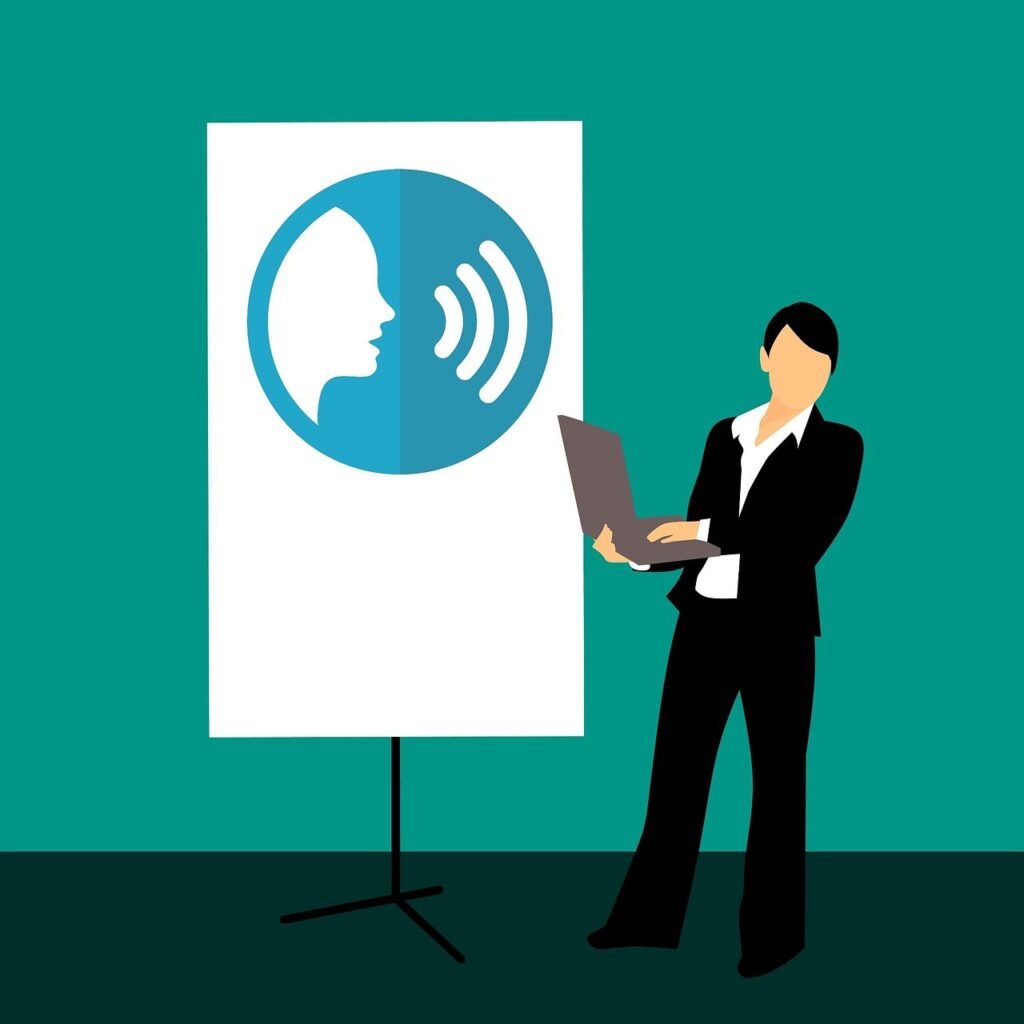- Mastering clear articulation is essential for achieving proper enunciation and improved verbal communication.·
- Vocal warm-ups, tongue and jaw exercises, and tongue twisters will improve the clarity of speech.
- Practice breathing exercises, diaphragmatic breathing, and pursed-lip breathing for better voice control and resonance.
- Utilize technology and tools to enhance enunciation.
How to Enunciate Better?
Mastering enunciation is vital to becoming a better speaker. Here’s how to enunciate better:
- Identify your problem areas and start working on them to get better enunciation and, as a result come across as a competent speaker.
- For some, the issue is their fast-paced delivery, which can be corrected through developing slow speech habits.
- By focusing on mouth movements, facial movements, and tongue twisters, and with dedication over time, you can build your confidence while communicating clearly within any setting.
The Importance of Clear Enunciation

Effective enunciation is the building block of convincing communication, regardless of who you’re talking to. It helps convey your message and minimizes the chances of any misunderstandings. It also plays its role in cementing your authority as a good speaker and ensures that a clear and impactful message is conveyed to the audience.
Imagine you’re in a Zoom meeting or some important conference call, and all that the recipient can hear is some muffled sounds and mumbling from your end. Imagine losing all the meaning of your words due to your lack of clarity. Not only would this be a frustrating experience, but also a waste of time and energy for all concerned.
Proper pronunciation is essential for clarity in effective communication. By aiming to be clear in your speech, you’ll build self-confidence and credibility.
Adriana Vandelinde
So, back to answering the question: how to enunciate better and get your point across first time, every time? In the following sections, we will explore expert tips to refine your enunciation skills and help you articulate your thoughts in a more refined way.
Mastering Clear Articulation

Some people speak in muffled tones or have slurred speech without even realizing it. This can be due to a lack of confidence or plain laziness. To identify if you have an issue, record your voice and listen to it objectively and attentively. Register the weak spots and make a note of them – do you understand what’s being said first time, every time?
You can enunciate better by articulating every syllable more clearly and stressing at the right point of each word. By knowing where to stress and pronouncing vowel sounds accurately, you can master the art of articulation and communicate more effectively.
🏋️ Vocal Warm-Ups for Clarity
You can engage in various vocal exercises to achieve clearer speech. These warmup exercises help strengthen your tongue muscles and jaw, stop mucus buildup while speaking, and reduce strain on your throat.
One exercise that works wonders is shaking your head vigorously. This may sound silly, but it remarkably helps relax your facial muscles for better enunciation – try it!
Also, try practicing simple tasks such as humming, stretching your mouth, or performing basic and complicated tongue twisters. These exercises will enhance your pronunciation ability, thus making you an accomplished and skilled speaker. Aim for at least 10 to 15 minutes of these exercises every day, to gain clarity and better enunciation.
The tongue plays a crucial role in properly pronouncing each sound. There are special drills involving individual vowel sounds like “Ah” or “Ee” that need attention, too.
By paying attention and trying to mimic how people around us shape their mouths while talking, we can develop correct pronunciation techniques over time with more ease.
Related: 10 Public Speaking Exercises To Boost Your Presentation Skills.
🗣️ Precision in Pronouncing Consonants
There are 21 constant sounds in English, and each sound requires precise pronunciation. Proper enunciation and pronunciation matter a lot in enhanced speech intelligibility.
To achieve this, you can practice tongue twisters, especially with a cluster of consonant sounds.
Here are some tongue twisters that you can practice to enunciate better.
- Peter Piper picked a peck of pickled peppers.
- She sells seashells by the seashore.
- How can a clam cram in a clean cream can?
- Six slippery snails slid slowly seaward.
Exercises explicitly dedicated to improving articulation are also advantageous when aiming to master an accurate delivery.
👂 Emphasis on Vowel Sounds
You may have heard about 5 vowels in English, but interestingly, there are twenty vowel sounds in total. For a non-native speaker, some of these vowels can be difficult to master.
Identifying the distinct short vowel sounds and long vowel sounds and focusing on them will improve the clarity and diction of your speech. Exercising these single vowels helps sharpen articulation, as they are the building blocks of language.
Strengthen Your Speaking Voice

A strong voice is the perfect medium to convey your message across. A strong voice holds authority and lets you speak for longer spells. You can work on your voice by practicing breathing exercises and warming up your muscles, just like you warm up your muscles before physical activity.
🫁 Breathing Techniques for a Stronger Voice
By undertaking breathing exercises, you’ll not only expand your stamina but also learn how to enunciate better. One such breathing exercise is to breathe through your diaphragm. When practicing diaphragmatic breathing, you mindfully take deep breaths to engage your diaphragm. Hold your breath for some time, and then slowly and mindfully exhale it through your mouth.
Another breathing exercise for better enunciation is to practice pursed-lip breathing. For this exercise, begin by inhaling slowly through your nose. Count to two and then exhale through your pursed lips shaped like you’re about to whistle.
These exercises help you with better control of your voice and, thus, better articulation.
👅 Resonance and Projection Exercises
A range of activities like humming scales, tongue twisters, and other stretching exercises can be used to give your speaking voice a more resonant quality while also improving its clarity and volume.
It’s interesting to note that, surprisingly, your posture also significantly contributes to your articulation and projection. Sitting in a bad posture will hinder your voice projection and put a strain on your vocal cords.
Sit in an upright position and start counting out loud. While counting out loud, put one hand on the sternum and consider lifting it. By practicing this routine over time, you’ll notice an effortless and easy projection.
Another exercise that helps with projection is activating your breath. Practice saying “ss” for long intervals and notice how it helps you with your voice projection. With time, you’ll notice a higher degree of projection in your voice.
The Art of Slow and Steady Speech

Another great way to enunciate better is to master the art of slow and steady speech. A slow delivery not only brings clarity to a message but also adds emotional depth to it, making it easier for the audience to comprehend your message.
You can also use body language and verbal expressions to further enhance the quality of your message.
🧘 Mindful Speaking Practice
Practice mindful speaking by carefully choosing words that serve your purpose. Don’t speak in an abrupt way with awkward pauses; it’ll weaken your message and persona. Curating the message in your head before delivering it with appropriate pauses is the secret sauce of mindful speaking practice.
When possible, you can also indulge in a few minutes of practicing meditation before conversing. This will increase the capacity to maintain equilibrium and maintain a positive vibe, too.
🐢 Pace Control Techniques
Manage the speed by adding well-paced pauses; this not only brings clarity but also enforces the message.
Training these techniques will ensure that people understand you more easily, ensuring that your message will be heard and comprehended.
Facial and Mouth Movements for Enunciation
Doing facial and mouth movements regularly over a period of time also helps with better enunciation. All the muscles and organs involved in delivering, like lips, tongue, and jaw, benefit from stretching and movements.
These exercises aim to sharpen enunciation by delivering a crisp voice through the proper movement of all muscles involved.
😀 Jaw Flexibility Drills
Having precise speech sounds requires proper movement and positioning of the lips and tongue, making lip flexibility an essential element for clear speaking.
It’s recommended to perform jaw exercises two to three times daily in order to improve your speech clarity. This includes snarling, stretching your mouth sideways, as well as pulling down on the sides of the lips.
Jaw mobility is another critical factor in delivering immaculate words. Try doing wide open-mouth stretches. For this exercise, open your mouth as wide as you can and hold it for as long as you can. Then relax your mouth. Do this exercise five to ten times.
Do these exercises daily to achieve the best results.
😛 Tongue Placement Awareness
Your tongue plays the most crucial role in pronouncing different vowels and consonant sounds. Being mindful of tongue placement results in clear speech with improved enunciation.
Incorrect or inconsistent positioning of the tongue can make it hard to articulate certain sounds correctly, particularly consonants that require contact with specific areas such as the alveolar ridge, soft palate, teeth, and hard palate. These sounds are also the most complex to master for some people.
To master these sounds, you can benefit from doing enunciation exercises that involve protruding your tongue toward the left side of your mouth while also reciting “tongue twisters”.
Tongue Twisters: A Fun Path to Pronunciation Perfection
To gain control over our spoken words and improve pronunciation, you can dive into the fun yet functional world of tongue twisters. You can find many tongue twisters readily available online with different difficulty levels and for specific sounds.
Start with simple ones and progress gradually to more complex challenges. This is a great way to sharpen the muscles used for speaking while also being able to clearly pronounce each word correctly.
These tongue twisters are fun to practice with family or friends. You can also include these tongue twisters in your game nights and master enunciation while having fun simultaneously.
💬 Starting with Simple Tongue Twisters
Tongue twisters can be fun when practiced in a laid-back fashion. Start with the basic and easy ones with your partner or friend and gradually level up as you would in any game,
While practicing tongue twisters, take your time and start slowly so that you can clearly enunciate each syllable in the phrase.
Some classic examples include:
- “Betty bought a bit of butter.”
- “How much wood would a Woodchuck Chuck if a Woodchuck could chuck wood?”
Repeat these basic tongue twisters multiple times until pronouncing them accurately becomes second nature. As you become more confident with the basic level, increase speed gradually while still maintaining clarity and accuracy.
🏆 Advanced Tongue Twister Challenges
After mastering the simple tongue twisters, aim for the more complex ones.
A few challenging examples of tongue-twisting sentences include:
- “She sells seashells by the seashore.”
- “The ragged rascal ran around the rugged rocks.”
Start slowly, and build up speed as it becomes easier. Regular practice with advanced tongue twisters will allow for perfecting your enunciation capabilities over time.
Utilizing Technology and Tools to Enhance Enunciation

In the digital age, you have the advantage of utilizing various apps and resources that are readily available on Google and Apple app stores.
Online courses, speech applications, as well as recording apparatuses, can be of great use to both give guidance and gain insight by means of self-evaluation.
All these tools may serve an essential role when it comes to improving pronunciation skills.
Related: 10 Proven Public Speaking Strategies to Boost Your Confidence and Impact.
📱 Enunciation Apps and Online Courses
Speaking clearly and accurately can be improved through the use of various enunciation-related apps and online courses. Various online tools such as Forvo Pronunciation, ChatterFox, ELSA Speak, Speechling, Bold Voice, or Pronuncian offer a structured approach to improving pronunciation with interactive activities.
Many popular learning platforms like Udemy. FutureLearn or Advanced Accent Training also provides comprehensive resources for honing speaking skills.
To these targeted services explicitly designed for accent refinement, there are language training websites that feature immersive practice in various languages – examples include Pronunciation Power, FluentU, and Babbel.
Rocket Languages and Rosetta Stone facilitate development via exercises aimed at bettering voice clarity. It is crucial when choosing an app or service platform that specific user needs are considered in order to best identify suitable options.
📹 Recording and Playback for Self-Assessment
To track your progress and improve pronunciation, recording and playback tools can be of great benefit. By listening to the recordings you have made yourself speaking, particular enunciation styles may stand out for further development.
Popular apps include Audacity, Otter, or Quick Voice2Text Email (PRO Recorder). Listen carefully in order to identify any points that should receive focused attention before commencing enunciation exercises geared toward improving your speech skills.
With these methods, you will be able to get a good idea as time goes on as to how much your pronunciation has improved over time due to precision focus on certain elements needing improvement.
Daily Habits for Continuous Improvement

The last and most crucial tip to enunciate better is to practice all the above points daily to attain the best results. Make a daily habit to converse and record yourself. Listening to yourself daily will help you identify your shortcomings and help you get better, day by day.
You can also get yourself a conversation partner and practice with them. In this way, you’ll get constant feedback on your speech that’ll motivate you to get better.
Related: 10 Proven Public Speaking Strategies to Boost Your Confidence and Impact.
🧑🤝🧑 Conversational Practice with Feedback
You can dedicate a minimum of 30-40 minutes to practice tongue twisters and conversation daily. During this practice, you can do your articulation, breathing, or phonics exercises. Make a personalized plan for yourself and see what brings the best in your speech, self-practice, or conversation with a partner.
Talking with others helps you detect problematic areas or identify certain challenging words.
🗒️ Note-Taking and Self-Observation
Taking notes and tracking progress are crucial components of improving enunciation. By reflecting on your speech patterns, you can identify the areas in need of improvement while also gauging how far you have come with practice.
Summary
Mastering enunciation is vital to becoming a better speaker. Weakened or incorrect enunciation of words and slurry or fast-paced speech can often misunderstood and fall on deaf ears.
You can identify your problem areas and start working on them to get better enunciation and, as a result come across as a competent speaker.
Identify your problem areas and rectify them with consistent practice. For some, the issue is their fast-paced delivery, which can be corrected through developing slow speech habits. In comparison, others may benefit from accent reduction.
By focusing on mouth movements, facial movements, and tongue twisters, and with dedication over time, you can build your confidence while communicating clearly within any setting.
How can I speak more clearly and enunciate better?
To improve clarity, practice speaking with vocal warm-ups, articulate each syllable, and engage your diaphragm. Focus on precise pronunciation, stress where necessary, and monitor your speed.
Why do I struggle to enunciate?
Struggles may stem from a lazy tongue, careless articulation, or underlying issues like dysarthria, affecting word pronunciation due to brain damage or weakened facial muscles.
How can I enunciate faster?
Train mouth muscles by practicing in front of a mirror, emphasizing short, simple vocabulary, and using techniques like holding a pencil in your teeth while stretching.
Are tongue twisters effective for improving pronunciation and enunciation?
Yes, tongue twisters enhance pronunciation by training vocal muscles, increasing tongue control, and improving speech accuracy through the use of alliteration.
What tools and technology can I use to enhance my enunciation?
Utilize online courses, apps like Forvo Pronunciation, ChatterFox, and recording tools such as Audacity. Explore language learning platforms like Udemy or engage with accent-reduction techniques for personalized improvement.
